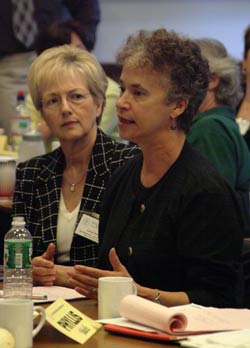A Tough Assignment
Can America's public schools get poor and minority students to perform as well as their wealthier classmates-or do disparities in income, health care and housing pose insurmountable obstacles? And is the federal No Child Left Behind Act (NCLB) helping or hurting the cause? That was the debate at the 63rd annual Superintendents Work Conference, hosted at TC in July. Titled "Closing the Education Gap," the conference was chaired by former New York State Commissioner of Education Thomas Sobol, Christian A. Johnson Professor of Outstanding Educational Practice at TC, with assistance from Gibran Majdalany, Associate Director, Organization and Leadership.
Kati Haycock, Director of the National Education Trust, sounded a hopeful opening note by highlighting high-achieving schools such as Centennial Place Elementary School in Atlanta, which is 91 percent African American and 79 percent low income, yet ranks in the top 10 percent of Georgia's schools in reading and in the top 12 percent in math. Such schools "have a single overarching goal and make no excuses," Haycock said. They also employ more challenging curricula that-along with quality teachers-result in lower failure rates even for the lowest-achieving students.
Those who followed Haycock took a more negative view, however.
"Public schools can't do this alone," said Edmund Gordon, Richard March Hoe Emeritus Professor of Psychology and Education at TC, and Director of the College's Institute of Urban and Minority Education. "Unless parents and the broader community begin to take on some of the responsibility for educating kids, we're just waiting for a miracle."
Gordon stressed the importance of "supplementary education"-museum visits, medical care, books in the home, and other factors that bear on a child's ability to learn. Since low-income parents can't always provide these things, he said, other institutions must pick up the slack.
"My son thanked me at my retirement by saying that there is nothing he couldn't do if he applied his mind to it," said the 82-year old Gordon, who is African American. "I don't remember ever saying that to him, but somehow he learned it, because he was socialized to ask questions and look things up. For other kids, though, that knowledge needs to be made explicit."
Jay Heubert, Associate Professor of Education and Law at TC, argued that graduation and promotion testing under NCLB disproportionately punishes the most disadvantaged students and ultimately damages society.
"The single strongest predictor of which students will drop out is who is returned to grade-more than race, ethnicity, school achievement, or the achievement of one's parents," he said. "And failure to achieve a high school diploma diminishes your lifetime earnings by more than half and increases your likelihood of incarceration."
Harvard Professor Gary Orfield, Director of the Harvard Civil Rights Project, argued that the resegregation of schools that has occurred during the past two decades dooms minority and poor students to failure under NCLB.
Orfield described a typical inner-city elementary school classroom in Hartford, Connecticut, in the mid-1990s. Three of the 23 students had been born with developmental disabilities and three with addictive drugs in their systems; 16 came from single-parent households and six had teen-aged mothers; eight lacked affordable housing, and nine were living in poverty.
"Segregation creates this kind of class," he said. "And if you're going to tell me that any teacher has an equal shot with this class compared with a teacher in a wealthy suburban school district, you're saying something ridiculous."
Still, the 66 superintendents responded most enthusiastically to fellow superintendent Allan Alson of Evanston Township High School in Evanston, Illinois, who is the founder of the Minority Student Achievement Network.
"When it comes to policy decisions that affect students, we have to act as though we're dealing with our own kids," he said. "Here's the catch phrase that describes the way students look at it: ‘I don't care what you know-I need to know that you care.'"
Published Wednesday, Sep. 22, 2004
